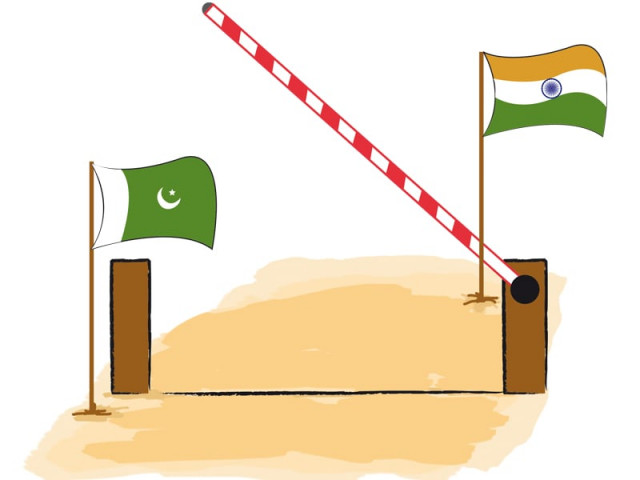Non-discriminatory market access: Pakistan, India all but sign trade normalisation deal
Both countries have reached broader understanding on liberalising bilateral trade: PM’s aide.

India has accepted Pakistan’s demand to exclude 160 items – mainly textile products – from its Pakistan-specific Sensitive List. ILLUSTRATION: TALHA AHMED KHAN
Pakistan and India are very close to clinching a deal on complete trade normalisation after New Delhi accepted Islamabad’s demand to remove textile products from its prohibitive list, an aide to Prime Minister Nawaz Sharif told The Express Tribune on Friday.
Both sides have reached a broader understanding on how to move forward on the issue of liberalising bilateral trade and overcome associated obstacles, said Miftah Ismail, special assistant to the prime minister and chairman of the Board of Investment.
Ismail is the first senior government official to speak at length about Pakistan-India trade talks, which have so far been held behind closed doors. He said both sides would simultaneously announce Non-Discriminatory Market Access on Reciprocal Basis (NDMARB) status for each other.

NDMARB was coined after the term Most-Favoured Nation (MFN) became controversial. The new term will grant India the same benefits as envisaged under MFN.
A special government panel chaired by Finance Minister Ishaq Dar has already decided to ask the federal cabinet to approve a fresh roadmap for granting NDMARB to India. A summary will be moved to the cabinet shortly and it is expected that both sides will notify changes by March 31, according to finance ministry officials.
According to Ismail, Pakistan will abolish the Negative List of 1,209 items which cannot be imported from India under the NDMARB agreement. Pakistan, in 2012, took a giant step by replacing the Positive List of 1,946 items, which could be imported from India, with the Negative List.
On the other hand, Ismail said that despite India’s claims that it had granted MFN status to Pakistan in 1996, New Delhi has so far not allowed Pakistan free market access. “There are restrictions on investment from and in Pakistan, for instance,” he said. “Until these restrictions are there, India cannot claim it has given Pakistan MFN status.”

Some of the items currently protected under the Negative List would subsequently be protected under the Sensitive List maintained under the South Asia Free Trade Agreement (SAFTA), Ismail said. According to him, automobiles and pharmaceuticals are two sectors which will be protected under the SAFTA Sensitive List, neutralising two lobbies against NDMARB status for India.
“As a nation we have sacrificed a lot while setting up the auto industry and we will protect it,” he said.
Meanwhile, India has accepted Pakistan’s demand to exclude 160 items – mainly textile products – from its Pakistan-specific Sensitive List, Ismail told The Express Tribune. India, he said, will also bring down the list from 614 items to 100 items.
As a first step towards NDMARB, Pakistan will allow India to import all goods through the Wagah-Attari border, Ismail said. The border would also remain open 24 hours a day, he added. According to him, the containerised movement of goods across the border will replace current labour-intensive practices.
Ismail said Pakistan has not compromised on anything while deciding to liberalise the trade regime with India. He said if India tried to create obstacles in the way of Pakistani goods, Islamabad would respond with the same intensity.
“Trade normalisation will triple the volume of Pakistani exports to India immediately,” Ismail said. He added that imports from India will substitute expensive machinery imports from Europe and West.
“In the end, it will be the consumers who will benefit from trade normalisation.”
Published in The Express Tribune, March 15th, 2014.



















COMMENTS
Comments are moderated and generally will be posted if they are on-topic and not abusive.
For more information, please see our Comments FAQ